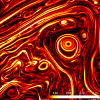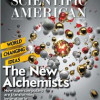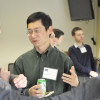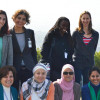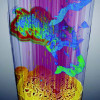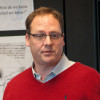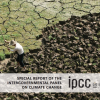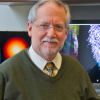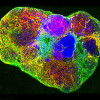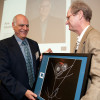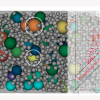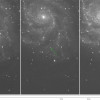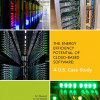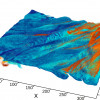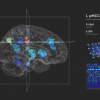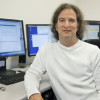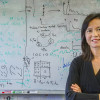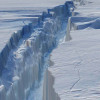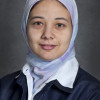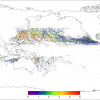News Center
Catching Turbulence in the Solar Wind
With help from Berkeley Lab's computational scientists and visualization experts, astrophysicists can now study turbulence in unprecedented detail, and the results may hold clues about some of the processes that lead to destructive space weather events. Read More »
Collaboration Shines in Materials Project Success
At Berkeley Lab, Computing Sciences’ world-class talent and resources have combined to help grow the Materials Project into a "world-changing idea," as it was proclaimed by Scientific American's December 2013 issue. Read More »
Lab Hosts Scientific Computing Day
On December 11, Berkeley Lab hosted Bay Area Scientific Computing Day (BASCD)—an annual one-day meeting to foster interactions and collaborations between researchers in the fields of scientific computing, computational science and engineering from the San Francisco Bay Area. Read More »
Berkeley Lab Hosts 5 Emerging Leaders During TechWomen 2013
TechWomen 2013 brought 76 women from 16 Middle Eastern and African countries to the U.S. in October for a five-week professional mentoring program. TechWomen is an international exchange designed to empower, connect and support women professionals in science, technology, engineering, and mathematics (STEM). This is the third year the Lab has been represented in the program. Read More »
Big Data Hits Beamline
When scientists from around the world visit Dula Parkinson’s microtomography beamline at Lawrence Berkeley National Laboratory’s Advanced Light Source, they all want the same thing: scientifically illuminating X-ray views of matter. Unfortunately, many of them have left with debilitating data overload. Department of Energy scientists like Parkinson are collaborating with computational scientists and mathematicians on data-handling and analysis tools. Read More »
Machine Learning Workshop
As part of the Computational Research Division’s strategic emphasis on increasing the role of computation in all aspects of scientific discovery, CRD staff organized a one-day workshop on Machine Learning for Science. The meeting was held Nov. 4 at Berkeley Lab. Read More »
Scientists See Better Climate Models, Warmer Future
Computational Researcher Michael Wehner was lead author on the newly released IPCC report’s chapter on long-term climate change projections. Among the conclusions were: most continents will continue to warm. Rain and snowfall patterns will continue to shift worldwide. Read More »
Applying the Magic of Mathematics to Solve Problems Using Supercomputers
As part of DOE's focus on supercomputing in September, CRD Director and applied mathematician David Brown answers five questions on how math makes supercomputers even more powerful tools for scientific discovery. Read More »
Berkeley Researcher Applies Graph Theory to Biofuels Research
With support from a DOE Early Career Award, Berkeley Lab Computational Researcher Aydın Buluç will develop faster and more energy-efficient data-mining algorithms in the quest for new biofuels. Read More »
OpenMSI: A Science Gateway to Sort Through Bio-Imaging’s Big Datasets
Mass spectrometry imaging technology is already helping doctors to better diagnose diseases, and leading to the creation of energy efficient and renewable biofuels. But researchers envision these areas of science progressing much faster—if only they had a standard set of computational tools to easily process, analyze and share these massive datasets. Now, they do—it’s called OpenMSI. Read More »
2013 Simons Institute Research Fellow: Sang-Yun Oh
As the first Simons Institute Research Fellow at Berkeley Lab, Sang-Yun Oh will be working with the Future Technologies Group to develop large-scale data analysis methodologies and algorithms. Read More »
Arie Shoshani Earns Berkeley Lab Lifetime Achievement Award
The leader of Berkeley Lab’s Scientific Data Management Research Group, Shoshani was honored at an Aug. 8 ceremony with the Berkeley Lab Prize for Lifetime Scientific Achievement. Read More »
Throwing a Lifeline to Scientists Drowning in Data
New computational techniques developed at Lawrence Berkeley National Laboratory (Berkeley Lab) may help save scientists from drowning in their own data. Computational scientists at the Lab have figured out how to streamline the analysis of enormous scientific datasets. The analysis uses the same techniques that make complex subway systems understandable at a glance. Read More »
Unusual supernova is doubly unusual for being perfectly normal
From the 'Backyard Supernova,' the Berkeley Lab-led Nearby Supernova Factory has built a benchmark atlas for normal Type Ia's Read More »
Study: Moving Computer Services to Cloud Promises Big Energy Savings
A six-month study led by Lawrence Berkeley National Laboratory (Berkeley Lab) with funding from Google has found that moving common software applications used by 86 million U.S. workers to the cloud could save enough electricity annually to power Los Angeles for a year. Read More »
Trillion Particle Simulation on Hopper Honored with Best Paper
An unprecedented trillion-particle simulation, which utilized more than 120,000 processors and generated approximately 350 terabytes of data, pushed NERSC’s Cray XE6 “Hopper” supercomputer to its limits. And, allowed Berkeley Lab researchers to glean valuable insights that will help thousands of scientists worldwide make the most of current petascale systems like Hopper and future exascale supercomputers. Read More »
Math of Popping Bubbles in a Foam
Berkeley Lab researchers have described mathematically the successive stages in the complex evolution and disappearance of foamy bubbles, a feat that could help in modeling industrial processes in which liquids mix or in the formation of solid foams such as those used to cushion bicycle helmets. Read More »
Berkeley Lab’s Aydın Buluç Wins 2013 DOE Early Career Award
Aydın Buluç of the Lawrence Berkeley National Laboratory’s (Berkeley Lab’s) Computational Research Division (CRD) has been honored with a 2013 Department of Energy’s (DOE) Early Career Award for his work on energy-efficient parallel graph and data mining algorithms. Read More »
Brain Visualization Prototype Holds Promise for Precision Medicine
Researchers from Berkeley Lab, UCSF and Oblong Industries presented a prototype of their brain simulation and innovative navigation interface at UCSF’s OME Precision Medicine Summit on Thursday, May 2. Experts believe that this visualization holds promise for the field of precision medicine. Read More »
Bert de Jong to Lead Scientific Computing Group
Bert de Jong of the Pacific Northwest National Laboratory (PNNL) has been named the new leader of the Scientific Computing Group in Berkeley Lab’s Computational Research Division (CRD). De Jong will join Berkeley Lab on July 1. Read More »
Berkeley Mathematician James Sethian Elected to National Academy of Sciences
James Sethian, an applied mathematician who leads the Mathematics Grooup at Lawrence Berkeley National Laboratory, was one of 84 new members and 21 foreign associates from 14 countries elected to the National Academy of Sciences in recognition of their distinguished and continuing achievements in original research. Read More »
At 14, SuperLU Solver Library Still Growing in Popularity
Since its launch in 1999, the SuperLU software library for solving sparse linear systems of equations has become the third most downloaded software at Berkeley Lab. Between Oct. 1, 2011 and Sept. 30, 2012, SuperLU was downloaded 24,303 times, nearly a 50 percent increase over the 16,876 downloads the previous year. Read More »
Berkeley Code Captures Retreating Antarctic Ice
Satellite observations suggest that the shrinking West Antarctic ice sheet is contributing to global sea level rise. But until recently, scientists could not accurately model the physical processes driving retreat of the ice sheet. Now, a new ice sheet model—called Berkeley-ISICLES (BISICLES)—is shedding light on these details. Read More »
Taghrid Samak Works to Affect Social Development in Egypt
On March 23 and 24, Taghrid Samak chaired the 2013 EgyptNEGMA conference to review 10 finalist proposals for advancing social development in Egypt and choosing the top three. The organizers of the top projects will go on an incubation trip to further network and receive more in-depth feedback through working groups based around their specific proposals. Read More »
Meeting the Computing Challenges of Next-Generation Climate Models
Berkeley Lab hosts an international workshop as climate scientists find themselves in a deluge of data. Read More »









